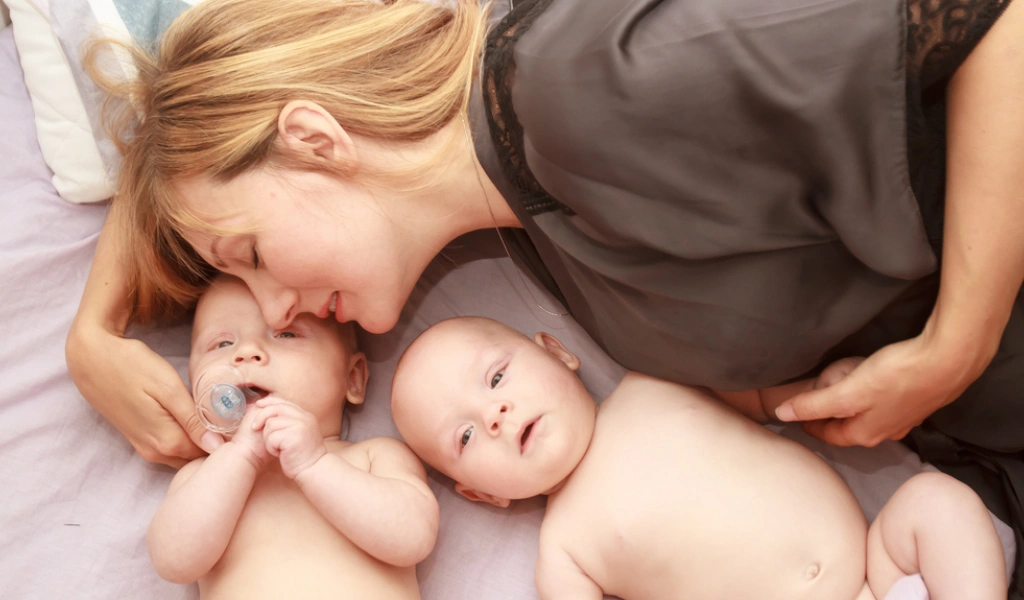Having a baby at a later stage in life that is at the age of 40 could create a more secure and nurturing setting for the child’s development and growth. Some women choose to wait to get pregnant until they reach the age of 40 before planning to get pregnant.
Nevertheless, a lot of these women worry about the negative impact of getting pregnant at a later age on both their health and the health of their baby. If you are considering getting pregnant at the age of 40 but are uncertain about the decision, it’s important to realize that as you age, your fertility decreases. Once you reach your 40s, the quality of your eggs may also decline.
Nonetheless, this doesn’t mean that getting pregnant at 40 is out of the question. The report from the CDC’s National Center for Health Statistics reveals that 135,735 successful live births in the US were from women over 40 out of a total of 3,664,292 live births.
Therefore, individuals wanting to conceive at 40 should consult with their healthcare provider to consider safe and healthy conception options. This article on ‘Benefits and Risks of Getting Pregnant at 40‘ offers information on the benefits and drawbacks of being pregnant at an older age, the reasons for declining fertility as you get older, and strategies for improving your chances of conceiving.
Likelihood of Conceiving a Baby at the Age of 40
The likelihood of getting pregnant in your 40s depends on your age. In your early 40s, there is roughly a 20 percent chance of conceiving, which is influenced by your menstrual cycle. As you progress through your mid-40s, this percentage decreases to around 15 percent.
After turning 45, the likelihood of conceiving decreases. At this age, the quantity of eggs starts to decline, leading to a decrease in fertility. Your diminished fertility is influenced not only by the quantity of eggs but also by the quality of the eggs.
By the time you reach your 40s, the eggs released by your ovaries are typically not as healthy and are more prone to chromosomal abnormalities. These abnormalities in your eggs can lead to a higher likelihood of miscarriage and birth defects. Older women are more likely to experience these complications.
However, the chance of getting pregnant in your 40s still exists as a subtle possibility.1
Benefits of becoming pregnant at the age of 40
While your ability to get pregnant decreases as you get older, there are advantages to having a baby in middle age.
1. Having a strong financial foundation
- Having a baby in your 40s allows you to be financially secure enough to fully support them.

- By this stage of life, your career will be thriving, and you will have reached a secure and stable position that allows you to provide for your family in every aspect of life.
2. Bringing up a child in a favorable setting
- Spending many years with your spouse allows you to become more familiar with each other. The relationship becomes very strong, providing a stable base for raising a family.
- Young parents often find themselves arguing and getting into conflicts because of their unstable financial situation, which frequently results in separation and can have negative consequences on their child’s welfare.
3. Making thoughtful and prudent choices
- You can make intelligent parenting choices for your child as a responsible adult.
Drawbacks Of Becoming Pregnant In Your Forties
Getting Pregnant after the age of 40 is linked to specific health and pregnancy risks. It is advised to receive additional monitoring and care during the entire pregnancy if you become pregnant at an older age.
Here are a few of the typical health problems you might experience while pregnant in your forties.
1. Illnesses while getting pregnant
- Having a pregnancy in your late 40s raises the likelihood of experiencing various health complications such as gestational diabetes, pre-eclampsia, placental abruption, high blood pressure, and placenta previa.

- In the 40s, common issues included irregular periods and fertility problems in women may occur. It is advisable to seek advice from a gynecologist for effective medications to treat menstrual disorders. If experiencing fertility problems, the gynecologist may suggest seeing a fertility specialist.
2. Challenges that may arise while getting pregnant
- Pregnancy in your 40s comes with potential birth concerns such as requiring a cesarean section, the possibility of the baby being born with low birth weight, the chance of the baby being in an abnormal position, and the risk of premature labor.
- It is likely that during the 40s, eggs could potentially encounter a chromosomal abnormality leading to a risk of miscarriage and the birth of a low-weight baby.
Risks Associated with Pregnancy at the Age of 40
A research study on pregnant women aged 40-45 revealed a greater likelihood of complications such as preeclampsia and gestational diabetes in this age bracket. Moreover, pregnancies occurring at a later age pose added risks.2
- Preterm delivery
- Fetal death in utero
- Cesarean delivery
Hence, it is recommended that women planning a pregnancy after the age of 40 consult their obstetrician to discuss potential complications and strategies to minimize them.
Additionally, maintaining a healthy lifestyle and ensuring proper care are essential for a successful and healthy pregnancy.
What causes a decline in fertility as one gets older?
Studies have found that the majority of women over the age of 40 experience problems with their eggs, leading to infertility as the main issue. By receiving proper medical care and restoring the menstrual cycle, women in their forties can regain fertility and have a successful pregnancy.
Furthermore, the production of hormones decreases as women age, causing a decrease in normal ovulation and ultimately lowering the fertility rate in older females.
Useful Tips for Increasing Your Likelihood of Getting Pregnant at 40
Increasing the likelihood of getting pregnant in your 40s can be achieved by making lifestyle changes. By following helpful advice, you can prepare yourself for a pregnancy at or after the age of 40.
1. Seek advice from a seasoned obstetrician
- Staying connected with a skilled gynecologist who conducts necessary tests to assess fertility issues is recommended.

- The physician will advise you on suitable treatments and techniques to enhance your chances of getting pregnant in your forties.
- The healthcare provider conducts a regular assessment of your body, which typically includes a Pap smear and pelvic exam. The examination lasts for approximately 15-20 minutes.
- Inquire with your doctor about ways to increase your likelihood of naturally getting pregnant.
- It is important to openly discuss your medical history and current lifestyle with the doctor.
- Consult with the physician about the possibility of continuing medication while attempting to get pregnant.
- Adhere to the doctor’s recommendation if there are any restrictions on certain medications or herbal supplements.
- Follow your doctor’s recommendations for getting vaccinated.
- Your doctor will carefully examine your health and advise you to receive vaccinations for serious illnesses like rubella and chickenpox.
2. Addressing current health issues
- Before getting pregnant, it is important to address any complicated health issues you may have first.
- If you are carrying excess weight, aim to shed the extra pounds by consuming healthy foods and engaging in consistent workout routines.
- Receive efficient medication for chronic health conditions like hypertension or thyroid disorders.
- Sexually transmitted infections can reduce the likelihood of becoming pregnant.
- Therefore, it is important to discuss any health issues with your doctor and promptly seek treatment for any sexually transmitted infections or diseases.
- If you are currently on any medication for a long-term illness like hypothyroidism, your doctor will recommend getting a blood test done before attempting to get pregnant. If the results show that your condition is under control, it is safe for you to conceive.
- However, you will need to have regular follow-up tests and your doctor may adjust your medication dosage as needed. Having any health issues reduces your chances of conceiving naturally.
- Therefore, it is crucial to disclose all your health conditions to your doctor beforehand. The doctor will recommend appropriate medications to address any health problems.
3. Adhere to a healthy routine
- To boost your fertility, it is crucial to make adjustments to your lifestyle and maintain a positive outlook on life.
- Attempt to quit smoking and consuming alcohol, as these habits hurt fertility levels.

- To alleviate excessive stress, one can incorporate various healthy activities such as yoga, cycling, swimming, jogging, and walking into their daily routine.
- Make sure to get enough sleep to ensure you feel refreshed.

- Adequate rest helps eliminate toxins from your body and contributes to a life free of stress.
- Ensure to adjust your eating plan and incorporate healthy foods into your diet.

- Fresh vegetables, whole grains, and foods high in folate, such as dark leafy greens, legumes, and citrus fruits, can be added to your meals.
- Increase your protein intake by including eggs, dairy products, fish, and lean meats.
4. Explore options for fertility treatments
- Getting pregnant naturally may become challenging after the age of 40, making fertility treatments necessary to improve your chances of success. This is especially true if you are older and past your prime reproductive years. It is advised to consult with your doctor to explore various fertility drugs and treatment plans that can enhance your fertility.
- Your physician might recommend taking oral medications like clomiphene or clomiphene citrate. These drugs can boost ovulation and improve the chances of getting pregnant. Nevertheless, studies show that fertility drugs can also increase the likelihood of having multiple pregnancies.
- The doctor might suggest receiving injections of Human Chorionic Gonadotropin (hCG) to increase your chances of fertility. The likelihood of having multiple births is typically elevated when undergoing this type of treatment.
- If your reproductive system is affected and hinders your ability to conceive, a physician may recommend surgical intervention. The procedure is aimed at correcting the problem and increasing the likelihood of successful pregnancy.3
5. Keep your body weight within a healthy range
- Obesity is a leading factor in both infertility and higher body mass index (BMI). Higher BMI levels can result in notable irregularities in ovulation cycles.

- Avoid extreme dieting or starvation as they can hurt the production of hormones in the endocrine system. Participate in consistent exercise to assist in weight loss.
- Avoid using hormonal supplements to lose weight because they can hurt the production of the follicle-stimulating hormone, which may result in a reduction in fertility.
- Participate in regular yoga routines designed to enhance fertility by promoting better blood flow to your reproductive organs.
6. Give thought to using donor eggs
- Your chances of conceiving naturally are low at this age, so it is advisable to explore the option of using donor eggs if you wish to become pregnant.
- Your likelihood of conceiving with healthy donor eggs is quite favorable.
- Surrogacy is an option where you can select a physically fit woman to carry your baby. This choice is gaining popularity in recent times, and having your partner’s backing can be beneficial.
Effective methods to increase your likelihood of getting pregnant in your 40s
Listed below are some natural remedies that might increase the chances of getting pregnant in your 40s.
- It is important to track your menstrual cycle and know when you are most fertile. The peak fertility usually occurs around the 14th day of your cycle and lasts for approximately ten days.

- Monitor your basal body temperature regularly and have sex around the time of ovulation. An increase in body temperature indicates ovulation has occurred and is the best time for intercourse.
- Use an ovulation prediction kit to pinpoint when ovulation is happening and increase your chances of conceiving.
- Pay attention to changes in your cervical discharge to see if the embryo has been implanted in the uterus.
- Avoid participating in intense physical activities like running, climbing stairs, and lifting heavy items during the program.
- Trying different sexual positions can enhance the chances of getting pregnant at the age of 40. The doggy-style position is often preferred for conception due to its ability to allow deeper sperm penetration.
- Health professionals suggest gently massaging the uterus to enhance circulation and promote the development of healthy uterine tissue.
- Detoxifying the body from toxins produced during regular metabolic functions with fertility cleansing can enhance the likelihood of conception by improving the body’s capacity to eliminate harmful substances.
Natural treatments to enhance fertility in your 40s
Taking healthy and nourishing fertility supplements like fresh garlic extract, vitamin C, and grapefruit juice can enhance fertility in women in their 40s. These herbal remedies have fewer side effects compared to pharmaceutical drugs.
Many herbal products help improve blood flow to the reproductive organs, regulate the secretion of important fertility hormones, and maintain the normal pH balance in the female genital tract.
Below are some potent herbal remedies that can aid in natural conception for women in their 40s.
- Saw Palmetto, which is a helpful herbal remedy sold over the counter, is commonly found in capsule form. It aids in promoting good reproductive health by addressing issues with menstrual irregularities.
- False Unicorn, an ancient herb used by Native Americans, is effective in treating female fertility issues, including recurrent miscarriages. It is particularly beneficial for women with a history of multiple pregnancy losses.
- Red Clover This herbal supplement aids in increasing natural female fertility rates. It assists in addressing hormonal imbalances, cleansing the blood, and providing essential vitamins to the body.
- Maca is a herb known for its ability to enhance libido and effectively treat female health issues such as polycystic ovarian syndrome.
- Vitex is a well-known herbal remedy that can aid in treating menstrual irregularities, managing ovarian cysts, and regulating ovulatory cycles.
Crucial Points to Bear in Memory
- Ensure you drink enough water to keep your tissues hydrated and healthy. Drinking an appropriate amount of water can make you feel satisfied, decrease cravings, and prevent unnecessary weight gain. Proper hydration can also enhance hormone levels and improve the likelihood of natural conception.

- Increase your intake of antioxidants through your diet. The active ingredients in antioxidants can counteract or remove free radicals and protect your eggs from potential harm or chromosomal defects.
- Feelings like stress, anxiety, and worry can have a damaging effect on the body’s production of important female reproductive hormones and can restrict blood flow to the reproductive organs. It is advised to lead a relaxed lifestyle and include practices such as yoga or meditation in your daily schedule to improve the chances of conceiving naturally at 40 and having an easy delivery.
Understanding the risks and benefits of planning a pregnancy or getting pregnant at the age of 40 is crucial. At this age, women’s fertility decreases due to a lower number of eggs. Advanced maternal age poses a higher likelihood of encountering abnormal eggs, miscarriages, and congenital issues.
Equipping yourself with accurate information can aid in decision-making and boost the chances of a healthy pregnancy at 40. Financial security and emotional maturity are advantages of having a baby later in life, allowing for the possibility of hiring help and accessing quality prenatal and neonatal care.
While certain complications can be managed through medication, the risk of pregnancy-related issues is greater in one’s 40s.
Key Takeaways of ‘Benefits and Risks of Getting Pregnant at 40’
- As women get older, their ability to conceive decreases, and by the time they reach 40, their eggs may have irregular chromosome counts.
- Having a baby at the age of 40 has its benefits, such as having better financial stability and being more capable of making informed choices.
- Pregnant women aged 40 and above face increased chances of developing gestational diabetes, pre-eclampsia, high blood pressure, and placenta previa.
- People in their 40s who want to improve their fertility should focus on living a healthy lifestyle, managing any current health problems, and seeking advice from a reputable gynecologist.


























